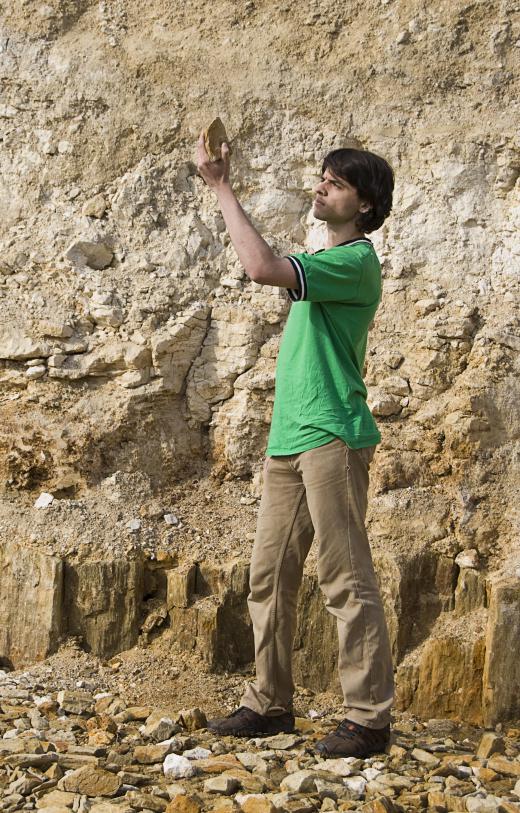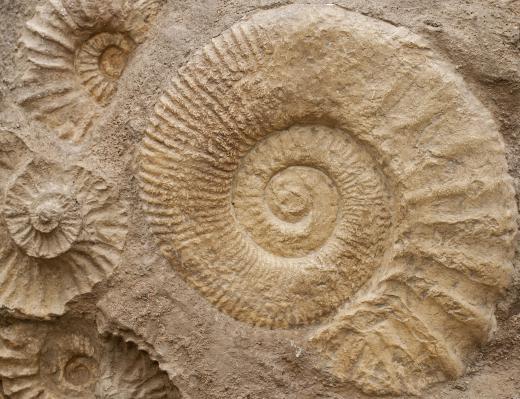What is Historical Geology?
 Jessica Ellis
Jessica Ellis
Written human history only dates back a few thousand years. The Earth is considerably older than the human race, and had gone through countless momentous events and changes long before humans arrived. Historical geology studies rock, mineral and geological formations to give modern humans a better picture of ancient history on Earth. Making use of modern technology such as radio carbon dating, historical geology teaches humans about the past, and may even give a glimpse into the future behavior of the planet.
Determining the age of rocks is an important part of historical geology. In the 19th century, the work of several prominent scientists brought the concept of radioactivity to light. More recent discoveries have shown that certain radioactive elements break down at a predictable rate into a more stable element form. By measuring a rock sample for the amount of the original element and its broken-down version, geologists can now get a fairly accurate idea of the age of the sample. Using radiometric dating, historical geology has made confident estimates not only about the age of rocks, but the age of the planet itself.

Sedimentary rocks are of great importance in historical geology and related fields of ancient history. Sedimentary rocks occur through compression of sediments over time, such as dirt, sand, and organisms. Much of science's fossil information comes from bones and skeletons embedded in sedimentary rocks. Historical geology can tell much about former species and extinction by examining fossils and surrounding rock. Sedimentary rocks can also give considerable information about past climates, as sediments will wear down differently depending on the atmosphere around them.

Historical geology does not only give clues to the past, it can also formulate understanding about the geological makeup of the present. Mining businesses and companies that search for oil and natural gas reserves often employ geologists that study historical geology. Understanding a region's past can greatly contribute to understanding the likelihood of certain substances or minerals in the present.

For centuries, it was believed that the Earth was only a few thousand years old. It is difficult to believe now that people at the time of the Civil War had never seen nor even heard of a dinosaur, as the first fossils were not discovered until the 1890s. When early geologist James Hutton proposed that the earth was millions of years old, he was met with almost universal scorn and derision. In the short time that it has existed, historical geology has uncovered untold mysteries about the planet humans inhabit.
AS FEATURED ON:
AS FEATURED ON:














Discussion Comments
@Mor - I guess understanding about craters on the moon gradually helped our understanding of a large part of our own geology as well. The Earth has been shaped quite a bit by impacts from outer space (and the moon herself is supposedly the result of a massive collision where part of the Earth broke away), not only in geography, but also in terms of biology as well.
Geological records have been crucial in working out timelines and how that might have happened.
@Iluviaporos - Well, I think back before they knew about dinosaurs they thought the bones they found were the remains of dragons. And I imagine children back then were interested in stories about mythological creatures, because they would have been told those creatures were real once (or even that they still were).
It must have been amazing to live through the time when they were first starting to really understand about fossils though. I feel like we take historical geology for granted at the moment, but it was actually extremely radical for the time. I mean, at one point they apparently wouldn't even believe that the moon was anything except a perfect sphere, because of religious dogma, even though anyone with a telescope, or even just a clear night, could tell there were shadows on it and it was far more likely that it had a rough surface.
I wonder what little kids would get obsessed about back when people didn't know that dinosaurs once existed. Almost every kid I've ever known, including myself, seems to go through a phase where they are absolutely fascinated by dinosaurs, and learn all kinds of facts about them. I can still remember the names of a whole bunch of them and whether they were carnivores or not, even though I don't remember ever studying them as part of a unit at school.
Post your comments